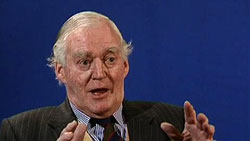 |
| Lieutenant Colonel Mike Lowry |
We were on an operational column from [Rousmount] and [Rozerus] town of North West Frontier Province. We were out on a punitive column to a place called Ladha and the first day out on December 7th, I can't forget it. On December 7th an Indian Battalion was cut up very badly by the enemy, tribesmen, Mahsuds mostly. They lost just about every officer, that's not quite true, but they lost a hell of a lot of their officers including their Commanding Officer, and every white officer of the Battalion except their Second in Command. The next day, after this had happened all day and night, I went out on an advance party. My own Company Commander and I were very young, and a Second Lieutenant, my own Company Commander were caught up on a camp picquet and because of the fighting going on he couldn't get back. So I had to command the company the next day and take it out. Well it wasn't particularly that day but a few days later I was going up on a camp picquet commanding my platoon as we did for opening the road, and going up these hills I suppose 800 feet from ground level, actually we were operating at about nearly 7,000 feet, quite high up, well over 6,000 anyhow, and it was on the way up to these camp picquets which we would picquet the route so that the road could be opened back and we wouldn't be shot at by tribesmen, so they wouldn't occupy the high hills, so we were occupying the high hills. Well, OK, it came about that we were there for several hours and then in due course the situation reversed and the rear guards came up and the picquets were withdrawn. It was on a withdrawal, on the way coming down, incidentally during the day what I should have said, some of the soldiers had seen Indian tribesmen 500-600 yards away. Actually, I myself had not seen them. Anyhow, on a withdrawal, and this is always a dangerous point on the North West Frontier operations, when you've got your backs as it were to the enemy, you're coming away, and so people on the ground below you are covering you with machine guns and artillery fire and whatever, and probably I would have a section down to cover us all for the final feature, but anyhow, as we did this and we were coming away, a volley of fire came over and I was hit and another one of my soldiers was also hit, a private soldier, and so had to stop because I was knocked out, I was hit in the face. So we had to stop, and after about 10 seconds or so I shouted which was the drill, once you stop like that you've got to go back to re-capture a suitable feature to hold it in case you were rushed by the tribesmen and you got ambushed or something, and so we would go back up to the feature, which is what we did, and I only had, at that time about fifteen to twenty men I suppose, but with somebody along the ground further down covering us and in due course because of the man who was also wounded, he was hit in the leg and couldn't move so we had to have a stretcher to get him away. In the meantime, my signaller stood up, very bravely I mean I asked him to, I have to admit, and he got a mention in despatches for it, signal back our problem in Morse code with his flags to ground and the artillery fire came down and so forth and the Company Commander of another company came up to boost the strength up there and make sure that we were ok and helped us away. Then we came back and I came to and was, in fact, working on a machine gun later on while still up there, but I was on my two feet and was all right. That's how it was. Funnily enough, on the same day, in other parts of the Battalion two other soldiers were also hit and I don't think anybody actually got killed that day, they were all wounded and so that was in December, just before Christmas 1940.